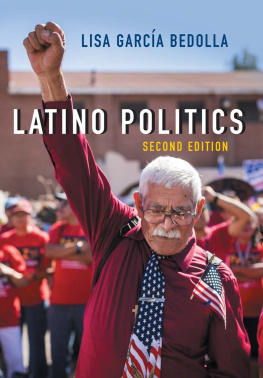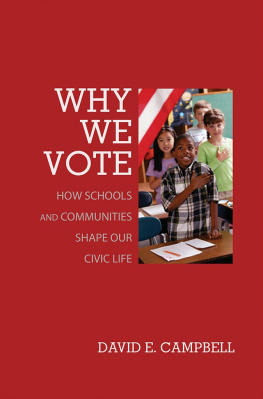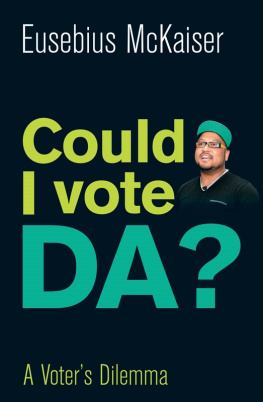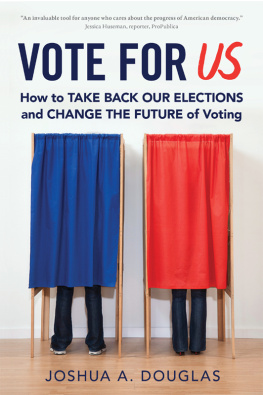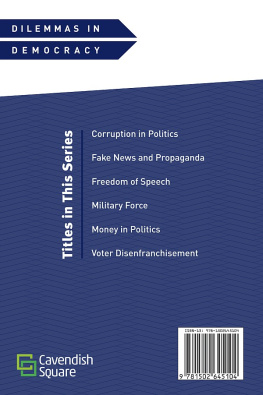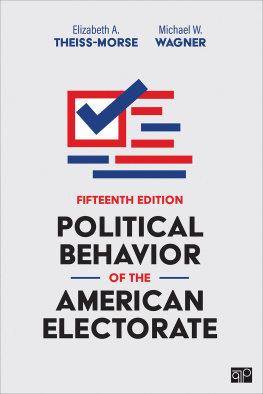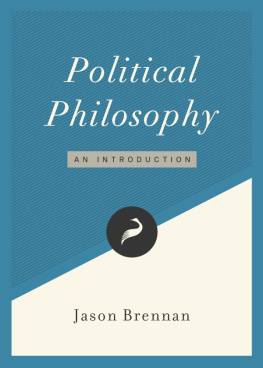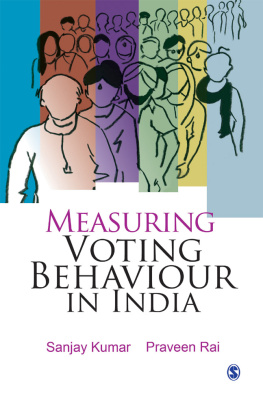MOBILIZING INCLUSION
The Institution for Social and Policy Studies at Yale University
The Yale ISPS Series
MOBILIZING INCLUSION
Transforming the Electorate through Get-Out-the-Vote Campaigns
Lisa Garca Bedolla & Melissa R. Michelson
Yale UNIVERSITY PRESS
New Haven & London
Published with assistance from the Louis Stern Memorial Fund.
Copyright 2012 by Lisa Garca Bedolla and Melissa R. Michelson.
All rights reserved.
This book may not be reproduced, in whole or in part, including illustrations, in any form (beyond that copying permitted by Sections 107 and 108 of the U.S. Copyright Law and except by reviewers for the public press), without written permission from the publishers.
Yale University Press books may be purchased in quantity for educational, business, or promotional use. For information, please e-mail (U.K. office).
Set in Galliard type by Newgen North America.
Printed in the United States of America.
Library of Congress Cataloging-in-Publication Data
Garca Bedolla, Lisa, 1969
Mobilizing inclusion : transforming the electorate through get-out-the-vote campaigns / Lisa Garca Bedolla and Melissa R. Michelson.
p. cm. (The Yale ISPS series)
Includes bibliographical references and index.
ISBN 978-0-300-16678-1 (pbk. : alk. paper) 1. Campaign managementUnited States. 2. VotingUnited States. I. Michelson, Melissa R., 1969 II. Title.
JK2281.G36 2012
324.7dc23
2012006640
A catalogue record for this book is available from the British Library.
This paper meets the requirements of ANSI/NISO Z39.481992 (Permanence of Paper).
10 9 8 7 6 5 4 3 2 1
To our CVI babies: (in birth order)
Paola, Joshua, Zachary, and Micaela
Thanks for keeping everything in perspective.
CONTENTS
CONSTRUCTING VOTERS
The Sociocultural Cognition Model and Voter Mobilization
VOTERS WILL THROW AWAY JESUS
Indirect Methods and Getting Out the Vote
CALLING ALL VOTERS
Phone Banks and Getting Out the Vote
KNOCK, KNOCK, WHOS THERE?
Door-to-Door Canvassing and Getting Out the Vote
NOTES FROM THE FIELD
Running an Effective Mobilization Campaign
EXPANDING THE ELECTORATE THROUGH PRACTICE
Voting and Habit Formation
CONCLUSION
Transforming the American Electorate
ACKNOWLEDGMENTS
A project of this size and scope engenders a large number of debts. Our greatest is to Don Green, our co-evaluator on the California Votes Initiative (CVI) and an incredible mentor, colleague, and friend. He provided excellent and constructive feedback all along the way, including during the experiments and through the subsequent years of data analysis. His expertise, kindness, and grace under pressure make him a joy to work with.
This project was made possible by the James Irvine Foundation, whose decision to link grant support for CVI organizations with rigorous social science evaluation allowed the academics and practitioners involved to expand not only the California electorate but also our understanding of get-out-the-vote (GOTV), far beyond what would normally have resulted from organization self-reports. As with any innovative project, our collaboration did not always go smoothly. Latonya Slack and Amy Dominguez-Arms at the James Irvine Foundation never stopped believing in the project; they provided guidance, intervention, and wisdom as needed. We applaud the foundation for taking the risk of engaging in this initiative, and we believe that the result has changed the face of California politics.
Changing the face of the California electorate and generating the findings presented in this book was the product of the efforts of the nine community-based organizations we partnered with in order to evaluate their get-out-the-vote campaigns. These groups have been working to improve their communities for decades, for little pay and, most of the time, even less recognition. We learned a tremendous amount from them about organizing, politics, and the problems facing their communities. We thank them for generously allowing us to observe their work, for listening to our suggestions, and for sharing their knowledge and optimism. We hope other groups and individuals interested in mobilizing their communities will benefit from these organizations experiencesboth the successes and the failuresas reflected in these pages.
This book would not have been possible without the tireless dedication of our research team: Jedediah Alfaro-Smith, So Yeon Cha, Kim Danh, Joanna Do, Elizabeth Fernndez, Jackie Filla, David Folmer, Aida Frias, Olivia Garca-Quiones, Alisha Glass, Christy Glass, Mara Elena Guadamuz, Marisol Gutirrez, Jacqueline Guzmn, Lisa Hahn, Jennifer Hernndez, Michael Jackson, Angela Ju, Nhi Khoan, Amanda Rose Knockaert, Carolynne Komata, Mzilikazi Kone, Christine Lee, Stephanie Loera, Gabriel Lucas, Margaret McConnell, Xavier Medina, Thien-Huong Ninh, Kim Panach, Javier de Paz, Susan Phay, Alexandra Ramos, Daisy Reyes, Jonathan Sarpolis, Betsy Sinclair, Joe Tafoya, David Tran, Diane Tran, Titi Mary Tran, Yamissette Westerband, Jaehee Yoon, and Arely Zimmerman. Those that worked as canvassing observers braved inclement weather, aggressive dogs, dangerous neighborhoods, and unfriendly voters in order to provide us with the narrative observations that form the basis of . Ricardo Ramrez provided critical research support and coordination for the National Association of Latino Elected and Appointed Officials (NALEO) experiments. Our other research assistants helped us to organize, systematize, and analyze the reams of paper and gigabytes of data this project produced. We thank them for all their time and effort. It is a pleasure to acknowledge their extraordinarily skilled work.
Our final framing benefited from feedback from Don Green, Vince Hutchings, Jane Junn, Taeku Lee, and Rogers Smith, along with the manuscripts anonymous reviewers. We also were privileged to receive questions and comments at a variety of public presentations of the book project, including talks in the Political Science and Sociology Departments at the University of California, Berkeley, the Economics Department at Loyola Marymount University, the Political Science Department at the University of Michigan, the Department of Political Science and the Wayne Morse Center at the University of Oregon, the Political Science and Ethnic Studies Departments at Santa Clara University, the Political Science Department at Stanford University, the Stanford University Center for Comparative Studies in Race and Ethnicity, and the Political Science Department at the University of Texas A&M. The input we received in all these instances was invaluable in clarifying and strengthening our theoretical frame. Any errors or confusion that remains is, of course, our own.
We received financial assistance for the final preparation of the manuscript from the Institute of Governmental Studies, the Graduate School of Education, and the Abigail Hogden Publication Fund at the University of California, Berkeley, and from Menlo College. Melissa Michelson received support during the crucial manuscript-writing phase of the project from the Stanford University Research Institute for Comparative Studies in Race and Ethnicity, which hosted her as a Visiting Faculty Fellow from 20092010. William Frucht, our editor at Yale University Press, was remarkably supportive of the project from the beginning and was instrumental in making the book come to fruition. His assistant, Jaya Chatterjee, was very helpful in getting the manuscript ready for submission. Our editor, Mary Pasti, provided excellent feedback and greatly improved the quality of our prose. Overall Yale University Press has been exceptionally easy to work with and has made the publishing process remarkably smooth.
When we embarked on this project, neither of us had any idea what we were getting ourselves into in terms of time, complexity, and commitment. For almost four years, we spent large amounts of time meeting with the participating organizations, our research team, and James Irvine Foundation staff, as well as randomizing lists and collecting and analyzing large amounts of data. Three more years were spent delving into the findings and their implications. To the extended family members, friends, colleagues, and acquaintances who put up with our stress, our busy schedules, and our various demands on their time and help, we extend our heartfelt thanks. We couldnt have done it without you. We owe you all chocolates and champagne.
Next page

